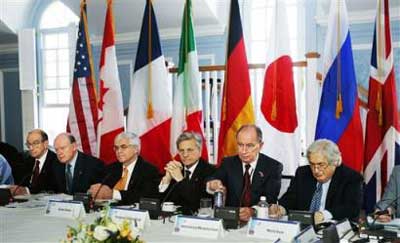|
G-7: Higher oil prices are a headwind
(Agencies)
Updated: 2005-04-17 09:46
WASHINGTON - Amid fresh jitters from Wall Street, finance officials from the world's industrial powers said Saturday surging oil prices could crimp the economy and they pledged to limit the fallout.
An intense discussion of the energy situation dominated the meeting attended by representatives from the United States, Japan, Germany, France, Britain, Italy and Canada.
"Higher oil prices are a headwind" and the global economic expansion "is less balanced than before," the finance officials said in a joint statement. They urged producers to increase energy supplies and said countries should conserve more.

World Bank President James D. Wolfensohn, right, International Monetary Fund Managing Director Rodrigo de Rato, second right, European Union Central Bank Governor Jean-Claude Trichet, third right, Federal Reserve Chairman Alan Greenspan, left, and US Treasury Secretary John Snow, second left, listen to opening statements at the start of the G-7 ministerial meeting, Saturday, April 16, 2005, in Washington. [AP] |
The Group of Seven countries endorsed more timely and accurate information about the oil market, which officials said could help control price fluctuations and make companies more willing to expand production.
The statement underscored finance officials' resolve to deal with the energy situation and reassure financial markets that the G-7 is on top of the matter.
The private talks a few blocks from the White House followed Wall Street's worst session in nearly two years. The Dow Jones industrials plunged 191 points on Friday as investors worried about high oil prices and the strength of U.S. economic activity.
In addition to the G-7 discussions, the 184-nation International Monetary Fund and World Bank were holding meetings this weekend.
At a news conference wrapping up the IMF's policy-setting committee, British Chancellor of the Exchequer Gordon Brown said concerns about surging oil prices also figured prominently in their discussions.
The IMF panel concluded that efforts need to be made to boost supplies, including greater use of alternative energy sources. "We recognize that the volatility of oil prices and particularly the high level in recent months could have a damaging effect on growth," Brown said. "We do believe there are measures that can be taken to make for a more efficient oil market."
U.N. Secretary-General Kofi Annan told international finance officials Saturday evening that developing countries could be encouraged to support efforts to prevent terrorism and nuclear proliferation if they received support from rich nations for more assistance and a greater voice in global affairs.
"Developing countries are more likely to support those vital and human rights objectives if they see that donor countries are willing to make greater effort for development and to give them a stronger voice in global economic governance," Annan said in prepared remarks.
Under tight security, several hundred people pressed for greater debt relief for impoverished countries and voiced opposition to the selection of Paul Wolfowitz, deputy defense secretary and an architect of the Iraq war, to run the World Bank. He starts on June 1.
The G-7 statement endorsed the goal of fully canceling debt for such countries. But officials have yet to resolve differences between competing plans from the United States and Britain.
"Once more the G-7 have chosen delay," said Jonathan Hepburn, policy adviser for Oxfam International, a supporter of expanded debt relief.
The Bush administration also used the G-7 meeting as an opportunity to pressure China to overhaul its currency system. The finance officials advocated "flexibility in exchange rates" — the phrase they have used before to prod China.
The United States wants China to stop directly linking the yuan to the dollar. Treasury Secretary John Snow said it was now time to act. "The next step is to do it," he said, rejecting claims by Beijing that it is not ready for the switch.
The administration has come under fire from members of Congress and U.S. manufacturers to take a tough line against China. Critics contend China's currency system hurts U.S. exports and has contributed to the loss of millions of jobs in American factories.
France's finance minister, Thierry Breton, said that in the G-7 group's discussion, "it was clear that the yuan is undervalued and there was a consensus that China has to address this."
Chinese finance officials accepted invitations to attend the two previous G-7 meetings. But they skipped this session, an apparent signal they did not want to be lobbied more intensely on the currency issue.
Energy prices were a concern at the last G-7 meeting in February and the one before that, but little action has resulted.
Snow acknowledged that G-7 statement itself "won't do much about the fundamentals for demand and supply of oil." But he said the statement should signal to the financial community that "the G-7 is monitoring the situation."
In the United States, oil prices surged to an all-time high of $57.27 a barrel at the beginning of April. They hovered above $50 on Friday.
"These energy prices are too high. ... They call out for action," Snow said.
Snow urged Congress to pass President Bush's stalled energy bill, which would open an Alaskan wildlife refuge to oil exploration. Bush used his Saturday radio address to make the same point, saying U.S. families and small businesses are feeling the pinch from rising gasoline prices.
"Oil prices pose the biggest growth risk at the moment," said Germany's finance minister, Hans Eichel. "Prices are high and volatile" which produces "an element of insecurity."
For now, energy prices are expected to slow economic growth modestly this year in the United States and elsewhere. "The outlook continues to point to solid growth for 2005," the finance officials said in their statement.
Still, they stressed the need for the United States to address its surging budget deficit and for Europe and Japan to deal with workplace barriers that are restricting economic growth. "Vigorous action is needed to address global imbalances and foster growth," they said.
|